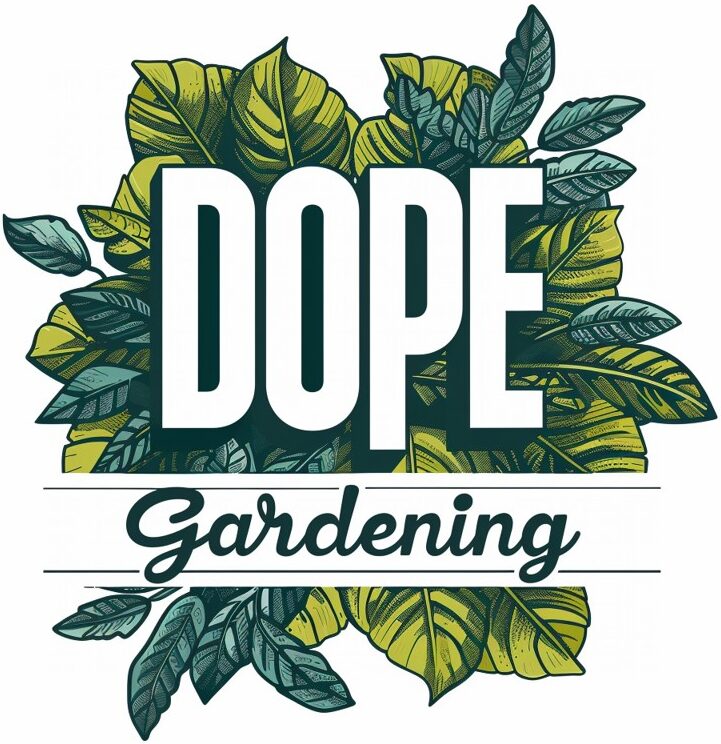Are Egg Shells Good for Compost? Discover the Benefits
Are you looking to boost the health of your compost and garden? Eggshells are a fantastic addition to compost because they add calcium, which helps plants grow strong cell walls. This nutrient is crucial for avoiding issues like blossom end rot in tomatoes and squash.
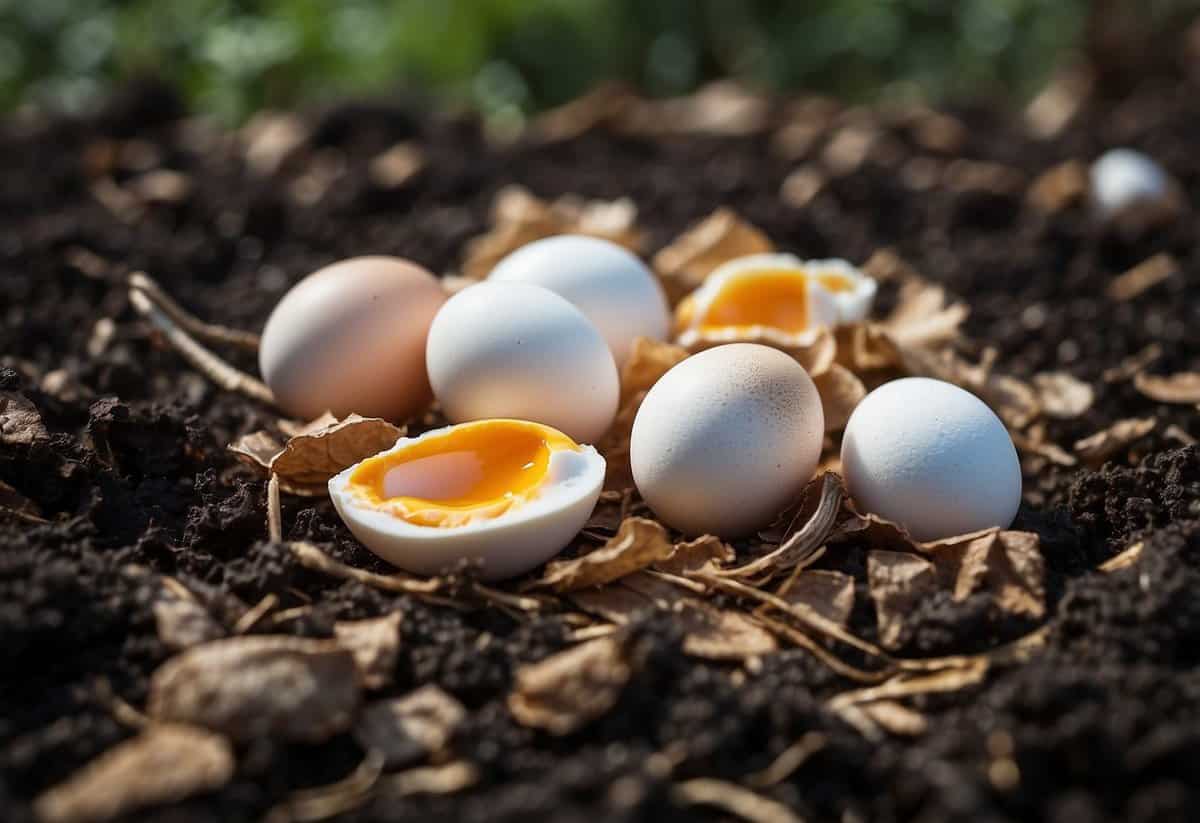
Not only are eggshells good for compost, but they also decompose well and enrich your soil. Adding crushed eggshells to your compost pile helps break down material faster, turning it into nutrient-rich humus you can use in your garden. Plus, using eggshells in compost is a great way to recycle kitchen waste.
For those dealing with calcium-deficient soil, eggshells offer a natural solution. They enhance soil quality and support the overall health of your plants. So next time you cook eggs, don’t throw those shells away—your compost and garden will thank you!
The Role of Eggshells in Compost

Eggshells play a crucial role in compost by adding important nutrients and improving the soil structure. They can also help with pest control, making them a valuable addition to your composting efforts.
Nutritional Benefits of Eggshells
Eggshells are rich in calcium carbonate, which is essential for plant health. When you add eggshells to compost, they break down and release calcium into the soil. This nutrient helps plants build strong cell walls, which is important for their growth. Without enough calcium, plants like tomatoes and squash may develop problems such as blossom end rot.
In addition to calcium, composting eggshells introduces smaller amounts of potassium, phosphorus, and magnesium. These nutrients support various plant functions, from photosynthesis to root development. By adding eggshells, you ensure your compost is nutrient-rich, promoting healthier and more robust plants.
Eggshells for Soil Structure and Pest Control
Crushed eggshells improve the soil’s structure by providing better aeration and drainage. When mixed into compost, these small pieces help prevent soil from becoming too compacted. This means roots can more easily spread and take up nutrients and water.
Eggshells can also act as a natural pest deterrent. The sharp edges of shell fragments make it difficult for pests like slugs, snails, and cutworms to move across the soil. While they won’t eliminate pests entirely, they can reduce their numbers, helping to protect your plants.
By incorporating eggshells into your composting routine, you contribute to creating a healthier environment for your garden to thrive.
Preparing Eggshells for Composting
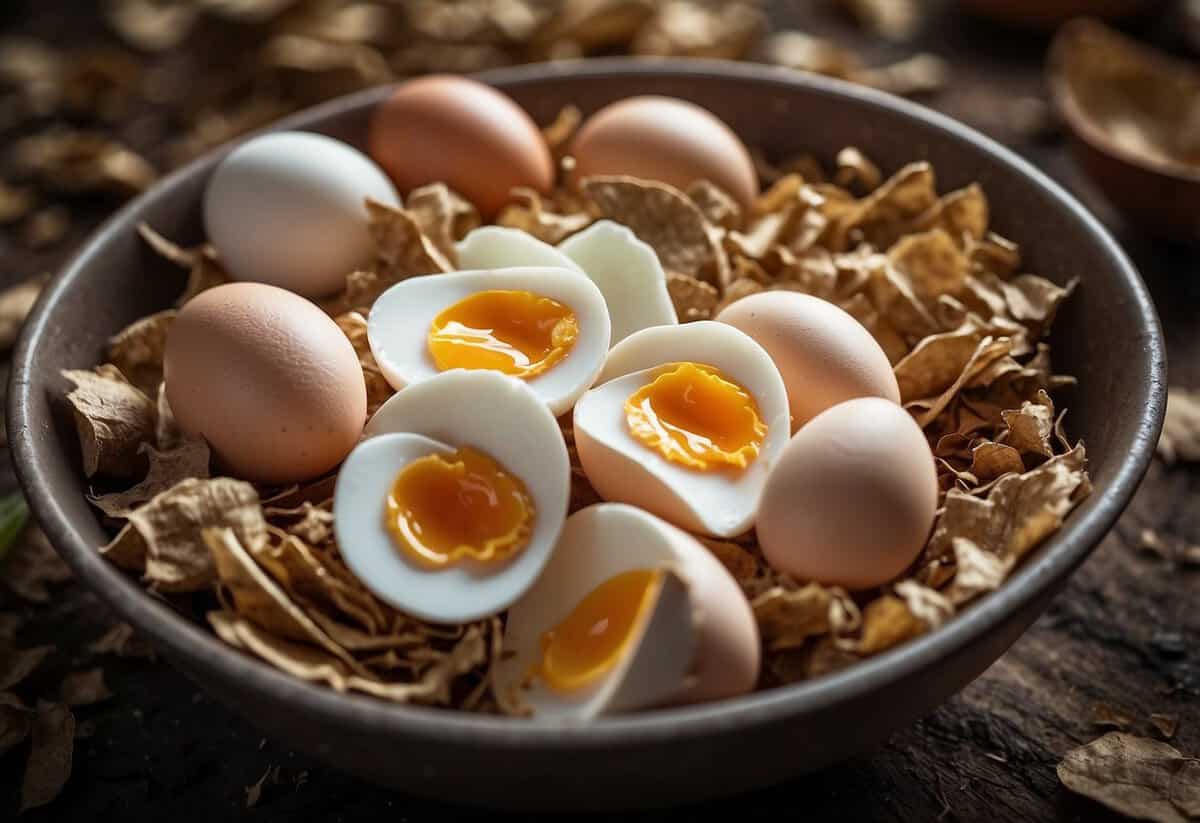
Getting eggshells ready for your compost is simple but important. You need to clean and dry the shells first, then crush them before adding them to your compost pile.
Proper Cleaning and Drying Techniques
To begin, rinse the eggshells thoroughly to remove any egg residue. This step helps to prevent any unwanted smells and deters pests from your compost pile. Once cleaned, you have a few options for drying.
One method is to place the rinsed shells on a baking sheet and bake them in the oven at 200°F for a few minutes. This not only dries the shells but also kills any bacteria that might be present. Another way is to let them air dry in a sunny spot. Either option ensures the shells are free of moisture before the next step.
Crushing and Adding Eggshells to the Pile
After the shells are dry, crush them into small pieces or a fine powder. This step is crucial because smaller pieces break down faster during the composting process. You can crush them with a rolling pin, mortar and pestle, or even a food processor.
Spread the crushed shells evenly throughout your compost pile. Eggshells are considered green composting material, containing nutrients like calcium. This helps your plants build strong cell walls and can prevent issues like blossom end rot in vegetables, which is related to calcium deficiency.
By following these steps, you ensure that your compost benefits fully from the nutrients in eggshells.
Composting Best Practices
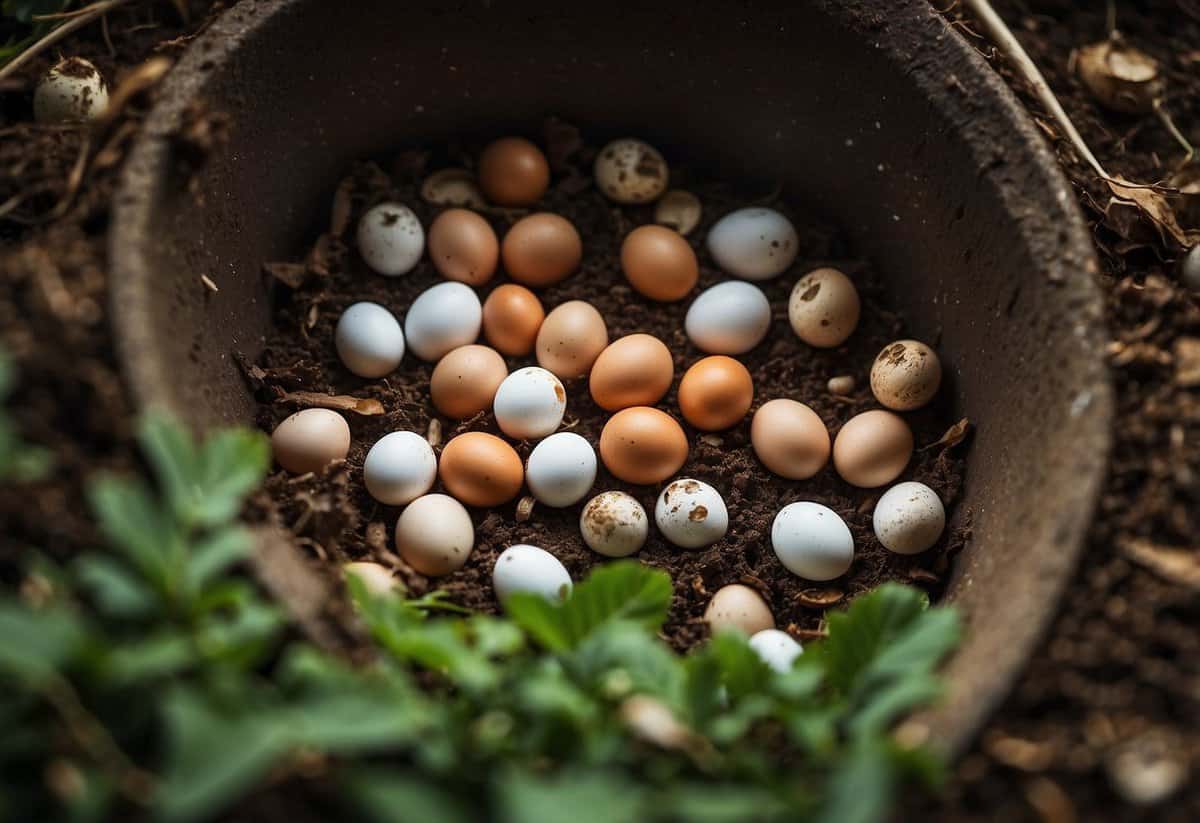
To maximize the benefits of composting eggshells, it is essential to follow some best practices. These include maintaining the right balance of materials in your compost and understanding how temperature and time can affect the decomposition process.
Maintaining the Right Balance
For effective composting, it’s important to balance green and brown materials. Green materials, like food scraps and grass clippings, add nitrogen. Brown materials, such as dried leaves and newspaper, add carbon.
Eggshells fall into the “green” category due to their high calcium content. To ensure optimal breakdown, mix your crushed eggshells with both green and brown items in your compost heap or worm bin. Avoid adding too many eggshells at once, as this can slow down decomposition.
Ratio Tip: Aim for a roughly 50/50 mix by weight of green to brown materials. This helps keep the compost balanced, providing an ideal environment for microorganisms to thrive.
Temperature and Time Considerations for Eggshells
Hot composting speeds up the decomposition process. To achieve this, your compost pile should reach temperatures between 140-160°F. This high temperature helps kill pathogens and break down materials faster.
For cold composting, which works at lower temperatures, expect a slower breakdown process. Although it provides a more consistent but slower decomposition rate, it’s still effective for eggshells.
Bake eggshells at 200°F for a few minutes to dry them out and kill bacteria. Crushing them into fine pieces before adding them can also accelerate decomposition.
Consistent temperature monitoring is vital. Use a compost thermometer to ensure your pile stays in the optimal range. Adjust your layers of organic material if temperatures fluctuate too much, keeping the process steady.
Common Concerns with Eggshells in Compost
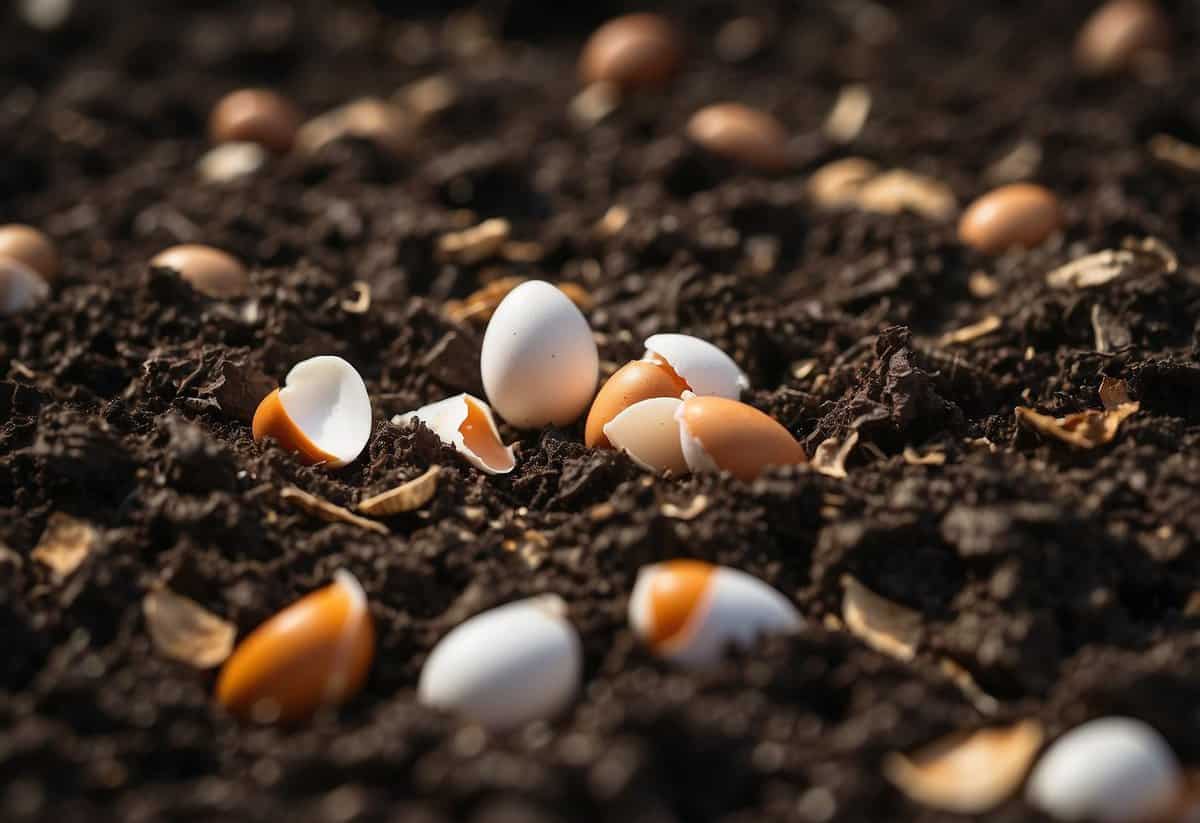
Eggshells can be a great addition to compost, but there are some common worries to consider. These include the risk of salmonella and the effect of eggshells on soil acidity.
Addressing Salmonella Risks
Cooking your eggs before composting can kill salmonella bacteria, reducing the risk. Salmonella can be a concern if the compost does not reach high enough temperatures. The EPA recommends hot composting, which reaches above 140-160°F, to kill harmful pathogens.
If you are still concerned, you can rinse and dry the eggshells before adding them. Baking the shells at 200°F for a few minutes can also kill bacteria. This step may give you peace of mind, especially if you compost kitchen scraps that might carry pathogens.
Eggshells and Acidity Levels
Eggshells contain calcium, which can help balance soil pH levels. In general, eggshells are not acidic and can reduce the acidity in your compost pile. This makes them helpful for gardens that struggle with acidic soil.
It’s a good idea to conduct a soil test to determine your soil’s pH and nutrient needs. This can help you decide how many eggshells to add. While eggshells add valuable calcium, they won’t significantly affect the levels of nitrogen, copper, zinc, and boron. Adjust your compost mix accordingly to meet your garden’s specific needs.
Using Eggshell Compost in Your Garden
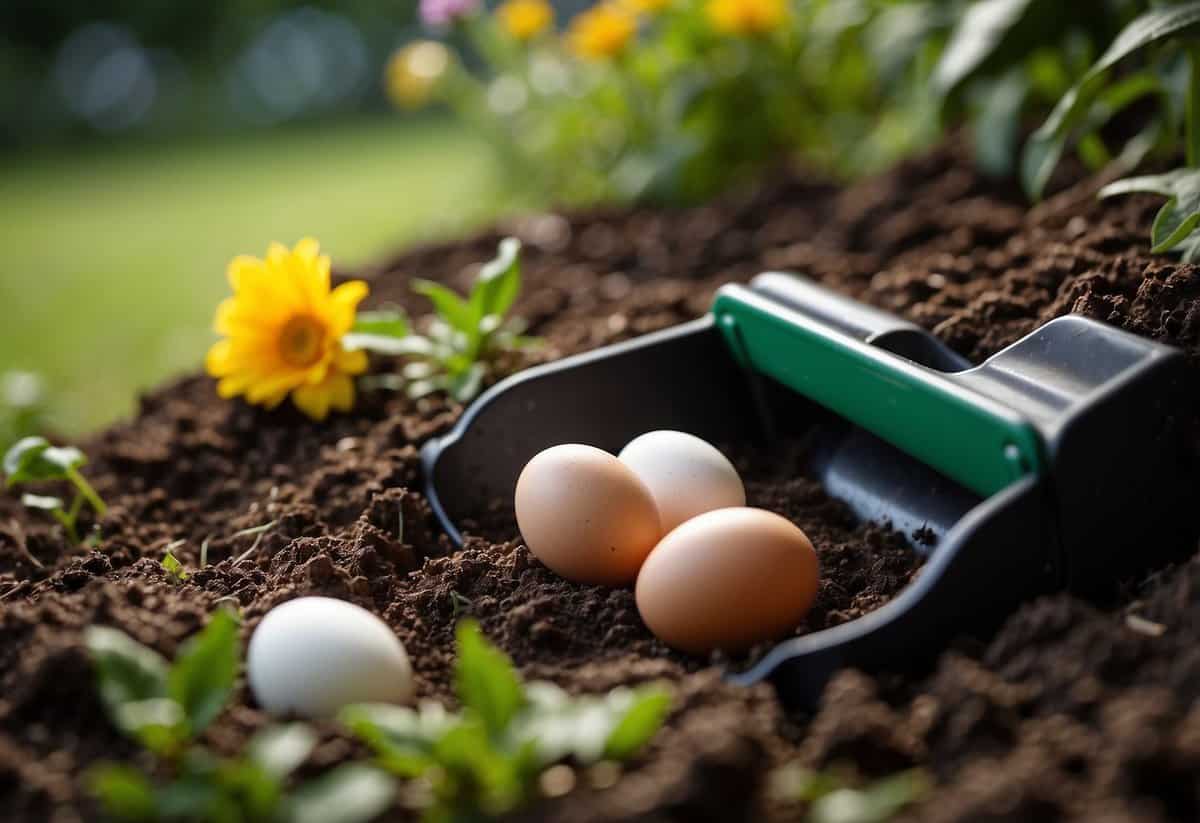
Eggshell compost provides essential calcium for your garden soil, which benefits a wide variety of plants, including tomatoes and other vegetables.
Feeding Your Plants
Crushed eggshells release calcium into the soil, an important nutrient that helps plants build strong cell walls. Calcium is especially vital for preventing blossom end rot in tomatoes.
Incorporate the eggshell compost into the soil where you’re planting seeds or young plants. You can also sprinkle some eggshells around the base of established plants. This slow-release fertilizer works over time, ensuring your garden gets a steady supply of calcium and other beneficial nutrients.
Additionally, eggshells can make a great addition to compost tea. Steep crushed eggshells in water for several days, then use this solution to water your plants. This method helps get the calcium directly to the plant roots quickly.
Tailoring Compost Application
Not all plants need the same amount of calcium. Tailor your application by adding more eggshell compost to areas where calcium-loving plants, like tomatoes and peppers, are growing.
For garden soil that is already rich in calcium, use eggshell compost more sparingly. This prevents an overload of calcium, which can lead to nutrient imbalances.
Steps for Application:
- Crushing and Spreading: Crush eggshells finely before adding them to your compost or directly to the soil.
- Targeted Application: Focus on areas around calcium-craving plants.
- Blend with Soil: Mix the eggshell compost thoroughly with the garden soil to ensure even distribution.
Keep in mind, consistency is key. Regularly adding eggshell compost enhances soil health, making your garden thrive season after season.
